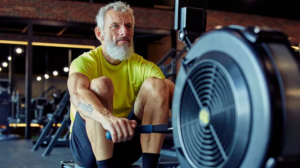93-year-old Richard Morgan could be just a retiree, peacefully spending his life with his wife, tending to his garden, or playing chess. A former battery maker and baker began exercising just 20 years ago, now having the physical condition of a thirty-year-old!
The Irish super-elderly man is now a four-time world champion in indoor rowing. He has the aerobic capacity of a healthy thirty or forty-year-old, with his body consisting of 80% muscle and only 15% fat. These were the conclusions of Irish researchers who studied his heart rate, physical condition, metabolism, heart, and lung function in a case study published in the Journal of Applied Physiology.
Venice Biennale: The opening of the Greek pavilion
It all started when Mr. Morgan watched a rowing training session with one of his grandchildren, who, as a college student, participated in rowing competitions. He now exercises for 40 minutes a day, starting with rowing about 18.5 miles. He also trains with weights for further strengthening two to three times a week, combining a mix of high and low-intensity workouts.
“I started from scratch and suddenly realised there was great pleasure in exercise,” he noted.
In addition to daily exercise, Mr. Morgan follows a protein-rich diet, which is key to building muscle and maintaining metabolism, regularly exceeding the usual dietary recommendation of about 60 grams.
“We need to study very active elderly people if we want to understand ageing,” said Bas Van Hooren, a doctoral researcher at Maastricht University in the Netherlands and one of the study’s authors.
However, Mr. Morgan likely had some genetic advantages, scientists point out, as his rowing ability seems to be a family matter. Moreover, his competitive performances in recent years are slower than they were 15, 10, or even five years ago. Therefore, while exercise may not have the ability to “erase” the effects of ageing, it can slow down its impact on the body.
Mr. Morgan’s case is a good example of people in their 90s and 100s who have achieved great longevity by remaining physically active. There are, however, other similar examples, such as 100-year-old Les Savino from Pennsylvania, who exercises for three hours a day, five days a week, combining weights and aerobic training.
There is now compelling evidence that just 20 minutes of physical activity a day reduces the risk of cancer, dementia, and cardiovascular diseases by about one-third, making it more effective than some medications.
Ask me anything
Explore related questions





